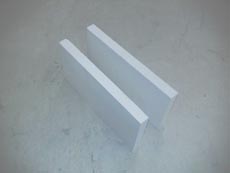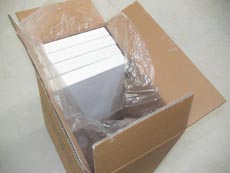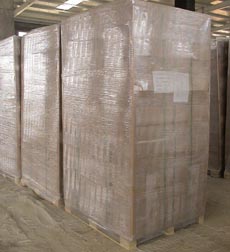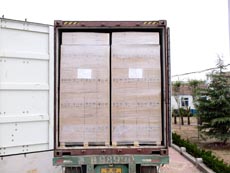| Home | About us | Calcium Silicate Board | Contact us | Send E-mail |
HENRY Calcium Silicate Board-1000 DEG C Calcium silicate board,Calcium Silicate BoardsHigh Temperature Calcium Silicate Insulation Slabs
|
|||||||
Items |
Unit |
HENRY-Standard Type |
GB/T10699- |
JISA9510-1995 NO.1-22 |
|||
HENRY-20 |
HENRY-23 |
HENRY-25 |
|||||
Bulk Density |
kg/m3 |
200 |
230 |
250 |
≤220, |
≤220 |
|
Flexural Strength |
MPa |
≥0.35 |
≥0.50 |
≥0.55 |
≥0.30 |
≥0.30 |
|
Thermal Cond |
W/m.k |
≤0.050 |
≤0.056 |
≤0.058 |
≤0.060 |
≤0.060 |
|
Temp. Limit |
℃ |
1000 |
1000 |
1000 |
1000 |
1000 |
|
Linear Shrinkage |
% |
≤2 |
≤2 |
≤2 |
≤2 |
≤2 |
|
 |
 |
 |
 |
|
|||||
Items |
Unit |
HENRY Brand |
|||
SCS-25 |
|||||
Bulk Density |
kg/m3 |
250±10% |
|||
Flexural Strength |
MPa |
≥0.50 |
|||
Temp. Limit |
℃ |
1100 |
|||
Linear Shrinkage |
% |
≤2(1050℃,3hrs) |
|||
Themal Cond |
W/m·k |
≤0.058±0.00011t |
|||
|
|||
Length(±3mm) |
Width(±3mm) |
Thickness(+3 -1.5 mm ) |
|
400 |
250 |
25-120 |
|
500 |
500 |
25-120
|
|
600 |
300 |
25-120
|
|
610 |
400、303、300、150 |
25-120
|
|
1000 |
500 |
25-120
|
|
1050 |
850 |
25-120
|
|
1080 |
950 |
25-120
|
|
1220 |
1220 |
25-100 |
|
|
|||
Items |
Unit |
Index |
|
Paste Density |
kg/m3 |
1000 |
|
Paste Bulk Drying Shrinkage |
% |
20 |
|
Temp. Limit |
℃ |
850/1000 |
|
Drying Density |
kg/m3 |
260 |
|
Themal Cond |
W/m·k |
0.06 |
|
Characterized by low drying shrinkage, good thermal stability, resisting alkali, weak acid corrosion and oil water soak, good adaptability, easy construction and no environmental pollution, HENRY-Paste Type insulation coating can be widely used for all types of furnaces, kiln, tower, pot, pipe, valve etc, especially easy construction for special-shaped equipment.
Also we have dry insulation coating and 1260C paste.
Construction Area:
Each ton paste can cover an area of 70-80m2 with 10mm thickness. The area of other thickness can be calculated from this
Calcium Silicate Boards: A Comprehensive Guide
Calcium silicate boards are an inorganic material primarily composed of xonotlite as the main crystal phase. These boards are made from siliceous and calcareous substances, reinforced with glass or carbon fibers. Using CNC machines, they can be precisely shaped into various components. Known for their superior combination of fire resistance, moisture resistance, and thermal insulation, calcium silicate boards are ideal for a variety of applications that require high-performance building materials.
What Are Calcium Silicate Boards Used For?
Key Features of Calcium Silicate Boards
-
Fire Resistance: Calcium silicate boards are renowned for their exceptional fire-resistant properties. They are non-combustible, capable of withstanding high temperatures for extended periods without igniting or emitting toxic fumes. This makes them essential in fire-sensitive environments such as hospitals, schools, and industrial plants.
-
Moisture Resistance: These boards offer high resistance to moisture and humidity, making them ideal for both indoor and outdoor applications. They are commonly used in damp areas like bathrooms, kitchens, and basements, where moisture control is critical.
-
Structural Integrity: Calcium silicate boards are highly durable and possess excellent structural strength, making them suitable for use as load-bearing components in construction. They can withstand heavy loads and are resistant to impact damage.
-
Sound Absorption: With their sound-absorbing properties, calcium silicate boards help reduce noise transmission, making them perfect for soundproofing applications in spaces like offices, hotels, and other commercial settings.
Versatile Applications of Calcium Silicate Boards
The versatility of calcium silicate boards makes them ideal for a wide array of applications:
-
Construction:
-
Partition Walls: Calcium silicate boards are commonly used for interior partition walls in buildings due to their fire resistance, moisture resistance, and structural strength.
-
Ceiling Panels: These boards are often used as ceiling panels, offering fire protection, sound absorption, and thermal insulation.
-
Exterior Cladding: In certain cases, calcium silicate boards serve as durable and fire-resistant cladding on building exteriors.
-
-
Industrial Applications:
-
Fireproofing: These boards are crucial in fireproofing steel structures, pipes, and equipment in industrial settings.
-
Insulation: Calcium silicate boards can be used as insulation for high-temperature pipes and industrial machinery.
-
Chemical Processing: Thanks to their chemical resistance, calcium silicate boards are widely used in chemical processing facilities.
-
-
Marine Applications:
-
Fire Protection: Calcium silicate boards are also used for fire protection on ships and offshore platforms, ensuring safety in marine environments.
-
Insulation: These boards are used to insulate pipes and machinery in marine applications, providing both thermal insulation and fire resistance.
-
Installation and Maintenance of Calcium Silicate Boards
Installing calcium silicate boards is straightforward. They can be cut, drilled, and fastened with standard tools. However, it's crucial to follow the manufacturer's installation guidelines to ensure optimal performance and longevity.
Regarding maintenance, calcium silicate boards are relatively low-maintenance. They do not require frequent cleaning or repairs. If any damage occurs, it should be addressed promptly to avoid further deterioration.
Conclusion
Calcium silicate boards offer unmatched fire resistance, moisture resistance, and durability, making them a highly versatile building material. Whether used in residential, industrial, or marine settings, their unique properties provide long-lasting performance in even the most demanding environments. Understanding the advantages and potential applications of calcium silicate boards allows architects, builders, and contractors to make informed decisions, optimizing the safety and efficiency of their projects.
Online order High quality High temp Calcium Silicate Slabs and High Pure Calcium Silicate Board now.
Site:http://www.calciumsilicateboard.com
E-mail:jack@calciumsilicateboard.com
SKYPE:calciumsilicateboard
Copyright Notice © Henry calcium silicate board Limited.All rights reserved.